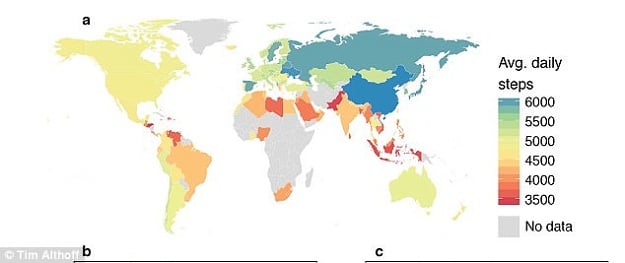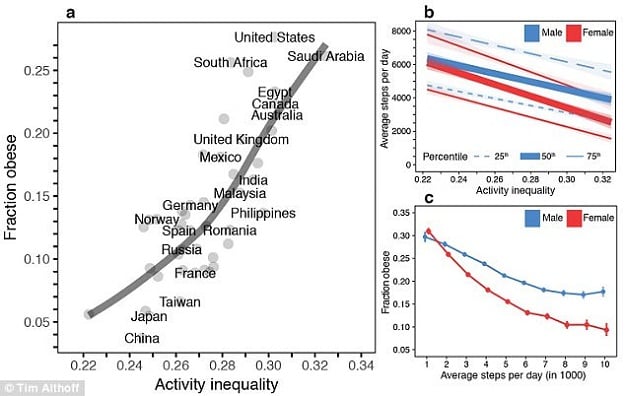Do you live in the world's laziest country?
Indonesia is the world's laziest country

A new study has found links between obesity and cancer. PHOTO: FITNESSEDGECLEVELAND.COM
Stanford University has conducted a 46-country study to record the activity of citizens and found that Hong Kong is the fittest country with residents walking 6,880 steps every day and Indonesia is the laziest managing only 3,513 steps each day.
Interesting to note here is the fact that India ranked 39 with people walking just 4,297 steps a day, making it one of the laziest countries in the world, according to the study. The study also showed that the average number of daily steps over the world is 4,961.
The study says, “We study a data set consisting of 68 million days of physical activity for 717,527 people, giving us a window into activity in 111 countries across the globe.”
Male brains 'overwhelmed' in multitasking test: study
“We study 68 million days of minute-by-minute step recordings from anonymised users of the Argus smartphone application developed by Azumio,” the authors Althoff et al wrote in the study.
Scott Delp, one of the researchers, told BBC, “The study is 1,000 times larger than any previous study on human movement. There have been wonderful health surveys done, but our new study provides data from more countries, many more subjects and tracks people’s activity on an ongoing basis.” He claimed that this opens new opportunities of “doing science at a much larger scale than we have been able to do before.”
The findings provide crucial insight into the lifestyles of people of these countries and for the improvement of health.

 PHOTO: TIM ALTHOFF ET AL
PHOTO: TIM ALTHOFF ET ALTim Althoff, one of the researchers of the study said, “For instance, Sweden had one of the smallest gaps between activity rich and activity poor.. it also had one of the lowest rates of obesity.” He explained the relationship between “activity inequality” which is the different between the fittest and laziest of a country.
The US and Mexico have similar average steps, but the US has higher obesity levels. In both US and Saudi Arabia, there was high inequality and it was women who spent the least time being active.
Jure Leskovec, also part of the research team, said: "When activity inequality is greatest, women's activity is reduced much more dramatically than men's activity, and thus the negative connections to obesity can affect women more greatly."
The Stanford team said the findings help explain global patterns of obesity and give new ideas for tackling it. They also claimed that the city design and ‘walkability’ plays an important role in determining health. A country with high walkability opportunities had healthier people, while the more obese were those who relied on vehicles.
Smiling can actually make you look older, claims a new study
Data shows that Indian women walk even less than Indian men. While Indian women manage to walk barely 3,684 steps, men have registered 4,606 daily. The study found that for both males and females, a larger number of steps recorded is associated with lower obesity, but for females, the prevalence of obesity increases more rapidly as step volume decreases (232% obesity increase for females versus 67% increase for males; comparing lowest versus highest activity).
 PHOTO: TIM ALTHOFF ET AL
PHOTO: TIM ALTHOFF ET AL



















COMMENTS
Comments are moderated and generally will be posted if they are on-topic and not abusive.
For more information, please see our Comments FAQ